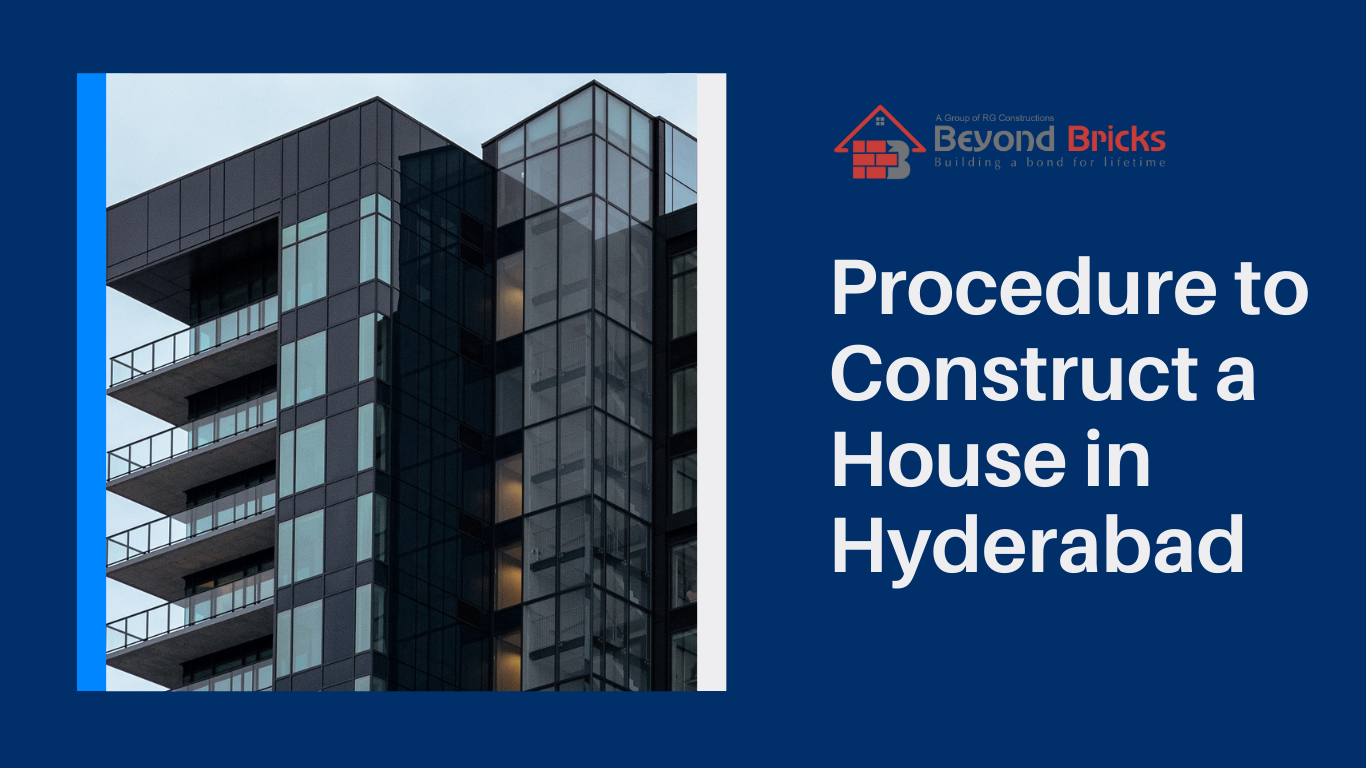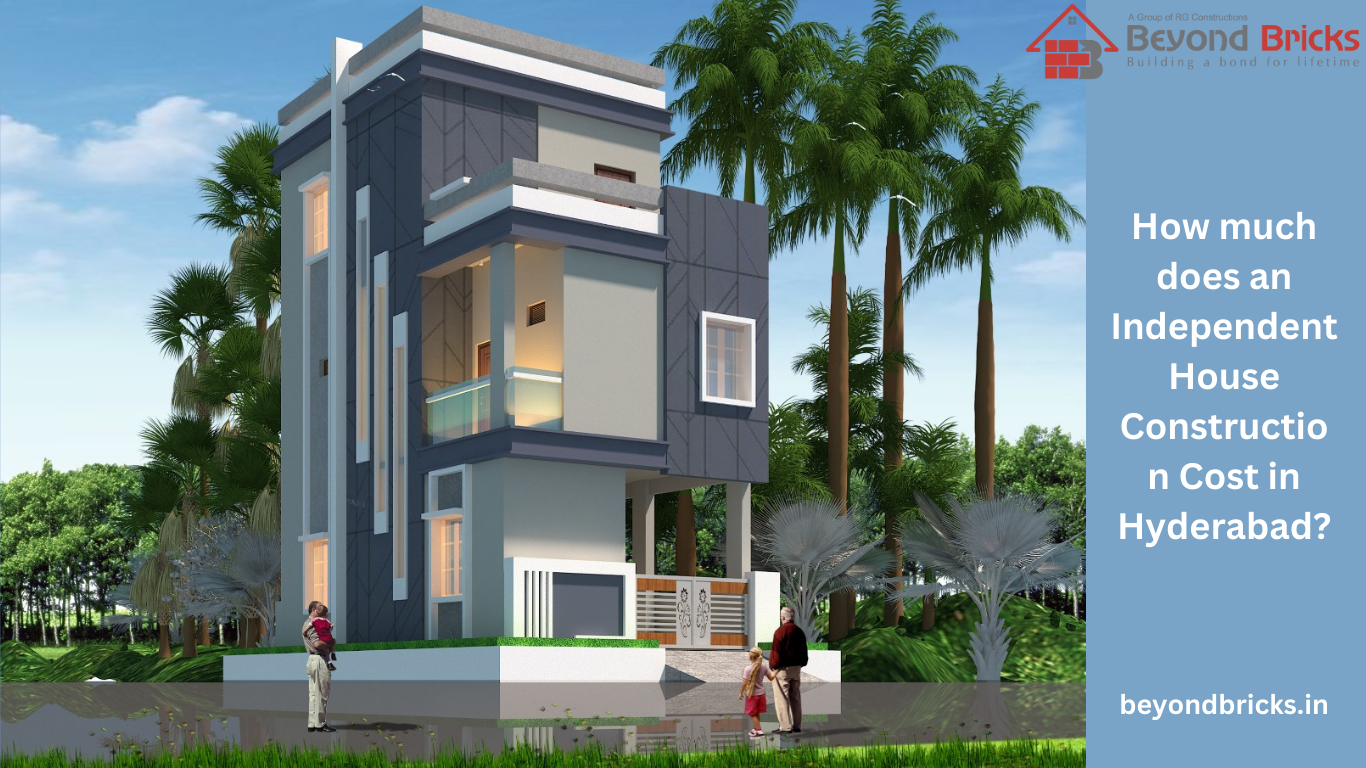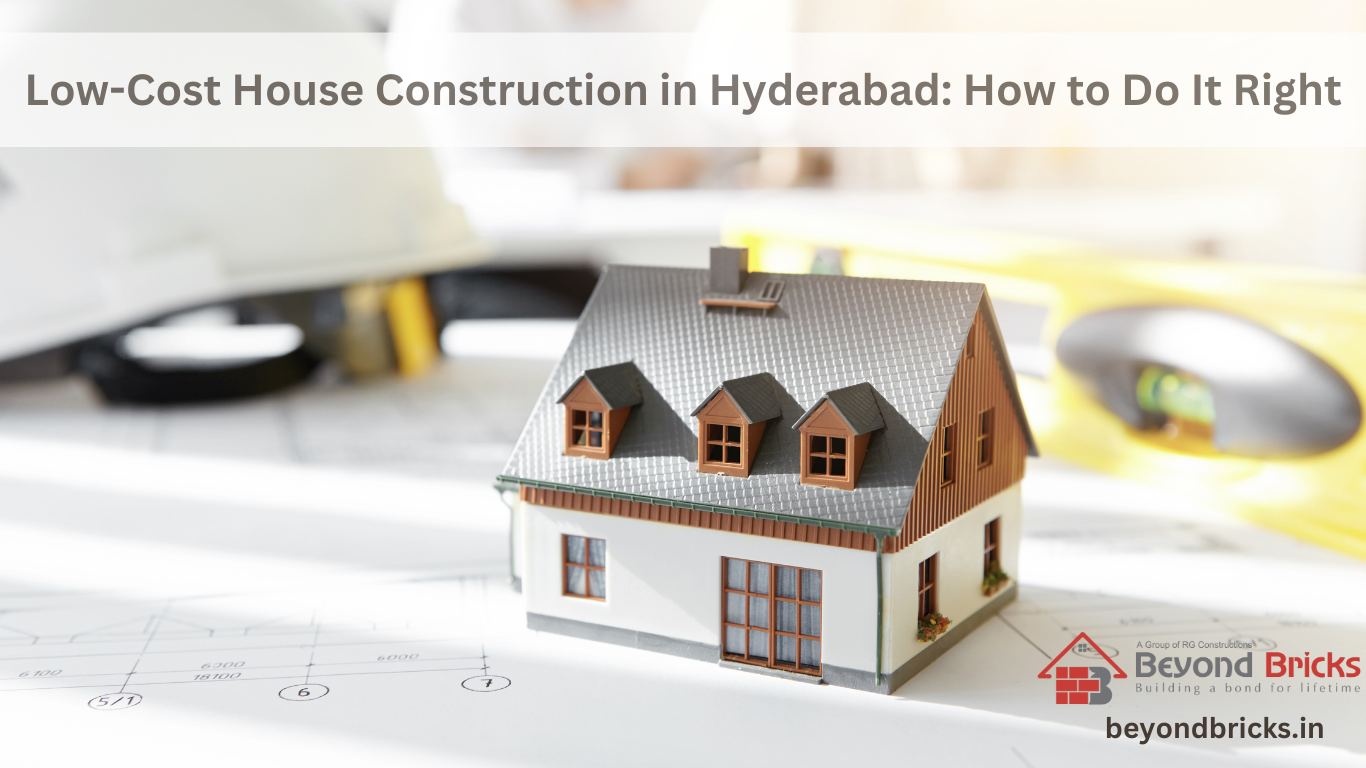Welcome to the vibrant city of Hyderabad, where dreams are turned into reality! If you've been contemplating building your own house in this bustling metropolis, then you're in for an exciting journey. Constructing a house can be both thrilling and overwhelming, but with the right knowledge and guidance, you can achieve your dream home seamlessly.
In this blog post, we will walk you through the step-by-step procedure to construct a house in Hyderabad. From hiring a licensed contractor to obtaining necessary permits and approvals, creating a detailed construction plan to sourcing materials – we've got you covered. So let's dive right in and discover how to turn your vision into bricks-and-mortar reality!
Here are the steps on how to construct a house in Hyderabad:
Select a plot:
- This is the most important step, as the location and size of the plot will determine the overall cost of the construction. Consider the following factors when selecting a plot:
- The location of the plot should be convenient for your needs, such as proximity to your workplace, schools, and other amenities.
- The size of the plot should be sufficient for your needs and should allow for future expansion if necessary.
- The soil condition of the plot should be good, as this will affect the cost of construction.
Location and Cost of Construction in Hyderabad
Hyderabad, often referred to as the "City of Pearls," is a thriving metropolitan city in India. Its rich cultural heritage and booming economy make it an ideal location for constructing your dream house. But before diving into the construction process, it's essential to understand the factors that influence the location and cost.
Selecting the right location is crucial. Hyderabad offers various neighborhoods with different price ranges and amenities. Areas like Gachibowli, Jubilee Hills, and Banjara Hills are known for their upscale residential properties but come at a higher cost. On the other hand, areas like Kompally or Miyapur offer more affordable options without compromising on quality.
Another important factor to consider is the construction cost. Hyderabad has a diverse range of building materials and technologies, so the cost of construction will vary depending on the type of home you're constructing. In general, homes are in high-end neighborhoods. The cost of construction in Hyderabad depends on several factors such as land prices, labor costs, material expenses, permit fees, etc. It's important to conduct thorough research and consult with professionals to get accurate estimates based on your specific requirements.
Additionally, keep in mind that property values can vary significantly depending on proximity to schools, hospitals,
commercial centers or transportation hubs.
By carefully considering these aspects while choosing your location and estimating costs accurately you can ensure a smooth start to your home construction journey in Hyderabad!
Get the necessary approvals:
You will need to obtain the following approvals before you can start construction:
-
- Building permission from the local government
- Land use certificate from the Hyderabad Metropolitan Development Authority (HMDA)
- Encumbrance certificate from the Registration Department
Step 1: Obtain Necessary Permits and Approvals
Obtaining the necessary permits and approvals is a crucial step in constructing a house in Hyderabad. This ensures that your construction project meets all legal requirements and regulations set by the local authorities.
To start this process, you will need to visit the relevant government offices or municipal corporations to obtain the application forms for building permits. These forms will require information such as the proposed layout, architectural plans, structural designs, and other details about your construction project.
Once you have filled out the application forms, you will need to submit them along with all supporting documents. This may include NOC (No Objection Certificate) from neighboring properties or societies, land ownership documents, environmental clearances if applicable, and more.
After submitting your application, it goes through a thorough review process where officials assess whether your construction plan complies with zoning laws and safety standards. Inspections may also be conducted at various stages of construction to ensure compliance.
Once all these checks are completed and there are no objections raised by any concerned parties or departments during public notice periods, you will be granted the necessary permits and approvals for your house construction project.
Remember that obtaining permits can take time due to the bureaucratic processes involved. It's essential to follow up regularly on the status of your application while ensuring that everything is being done according to regulations.
By obtaining proper permits and approvals before starting construction work on your dream house in Hyderabad, you can avoid legal complications down the line. It also guarantees that your home is built safely within established guidelines which ultimately adds value not only to your property but also provides peace of mind knowing that everything has been done correctly from an administrative standpoint.
Hire a contractor:
You can either hire a general contractor or hire individual contractors for each stage of the construction. The cost of hiring a contractor will vary depending on the scope of work and the contractor's experience.
Step 2: Hire a Licensed Contractor
When it comes to constructing your dream house in Hyderabad, one of the most crucial steps is hiring a licensed contractor. This step ensures that you have an experienced professional overseeing the construction process and ensuring everything is done according to code.
Finding a licensed contractor may seem daunting at first, but with some research and due diligence, you can find the right person for the job. Start by asking for recommendations from friends or family who have recently built their own homes in Hyderabad. They can provide valuable insights into their experiences and recommend reliable contractors they worked with.
Once you have a few potential candidates in mind, schedule meetings to discuss your project and get estimates. During these meetings, ask about their experience, qualifications, and previous projects. It's essential to ensure that they are familiar with local building regulations specific to Hyderabad.
Furthermore, don't forget to check if they carry proper insurance coverage for any unexpected mishaps during construction. This will protect both parties involved.
Before making a final decision on which contractor to hire, be sure to request references from past clients so you can gauge their satisfaction levels. Speaking directly with previous clients will give you insight into how well the contractor communicates, meets deadlines, and delivers quality workmanship.
Remember that choosing a licensed contractor is not just about finding someone skilled; it's also about establishing trust and open communication throughout the entire construction process. So take your time in selecting someone who truly understands your vision and has the expertise needed to bring it to life!
Design the house:
You can either hire an architect to design the house or do it yourself. If you are hiring an architect, make sure to get quotes from multiple architects before making a decision.
Step 3: Prepare a Detailed Plan for Construction
Building your dream house in Hyderabad requires careful planning and attention to detail. Once you have hired a licensed contractor and obtained the necessary permits, it's time to prepare a detailed construction plan. This step is crucial as it will serve as a roadmap for the entire building process.
You need to consult with your architect or designer to create a comprehensive blueprint of your house. This includes the layout of each room, placement of windows and doors, electrical and plumbing systems, and any other specific requirements you may have.
Next, consider factors such as natural lighting, ventilation, and functionality when finalizing the design. It's important to strike a balance between aesthetics and practicality to create a space that suits your needs perfectly.
Once the architectural plan is finalized, work closely with your contractor to develop an itemized list of materials required for construction. Research various suppliers in Hyderabad who can provide high-quality materials at competitive prices.
Additionally, make sure to include provisions for safety measures like fire exits or earthquake-resistant features if needed. These considerations are vital for ensuring not just comfort but also peace of mind once you move into your new home.
Remember that this is also an opportunity to incorporate sustainable practices into your building plans. Explore options such as rainwater harvesting systems or solar panels that can help reduce both costs and environmental impact in the long run.
Preparing a detailed plan not only helps streamline the construction process but also allows you to anticipate potential challenges beforehand. Collaborate closely with professionals involved in this stage so that every aspect aligns with your vision while adhering strictly to local regulations.
By investing time and effort into creating an effective plan now, you'll be setting yourself up for success throughout the entire construction journey!
Budget and Source Materials
Creating a budget and sourcing materials are crucial steps in the construction process. It's important to have a clear understanding of your financial limitations and ensure that you have all the necessary materials for your dream home.
Step 4: Create a Budget and Source Materials
First, determine your total budget for the project. Consider factors such as labor costs, material expenses, permit fees, and any unexpected contingencies. Remember to include a buffer for unforeseen expenses.
- The size and scope of the project: The size and scope of the project will have a big impact on the budget. A small, simple project will cost less than a large, complex project.
- The location of the project: The location of the project can also affect the budget. For example, if the project is located in a remote area, the cost of materials and labor may be higher.
- The type of materials used: The type of materials used will also affect the budget. Some materials, such as wood and concrete, are more expensive than others, such as steel and plastic.
- The availability of materials: The availability of materials can also affect the budget. If certain materials are in short supply, the cost of those materials may be higher.
Next, research suppliers and compare prices to find the best deals on quality materials. This may involve visiting local hardware stores or exploring online options. Look out for discounts or promotions that can help save money without compromising on quality.
When sourcing materials for construction, it is important to shop around and compare prices. You can also consider buying materials in bulk, which can save you money. It is also important to make sure that the materials you purchase are of high quality.
Once you've identified potential suppliers, request quotes and evaluate their reliability, reputation, and customer reviews. It's essential to choose reliable suppliers who can provide high-quality materials within your budget constraints.
- Get quotes from multiple suppliers: Get quotes from at least three different suppliers before making a purchase. This will help you to ensure that you are getting the best possible price.
- Consider buying in bulk: If you are planning on doing a lot of construction, you may be able to save money by buying materials in bulk.
- Ask for recommendations: Ask your friends, family, and colleagues for recommendations for construction suppliers. They may be able to give you some good tips on where to find the best deals.
- Check online: Several websites can help you to find construction materials. You can compare prices and read reviews before making a purchase.
As you start sourcing materials, maintain an organized record of purchases to track expenses accurately. This will help you stay within budget while ensuring timely delivery of required items during different stages of construction.
Remember to factor in transportation costs when calculating material expenses. Be proactive in coordinating with suppliers regarding delivery schedules to avoid delays or additional charges.
By creating a comprehensive budget plan and carefully sourcing materials at competitive prices without compromising on quality -You'll be well-prepared financially while ensuring that your project progresses smoothly toward turning your dream into reality!
Start construction:
Once you have all the necessary approvals and the house has been designed, you can start construction. The construction process will typically take several months to complete.
Step 5: Begin Construction
Now that you have completed all the necessary preparations, it's finally time to roll up your sleeves and start building your dream house in Hyderabad! This is where all your hard work and planning will begin to take shape.
The first step in the construction process is site preparation. This involves clearing the land, leveling it if needed, and marking out the boundaries of your future home. It's important to ensure that the site is ready for excavation and construction before proceeding further.
Next, the foundation will be laid. The type of foundation you choose will depend on various factors such as soil conditions, climate, and budget. Common types of foundations include slab-on-grade, crawl space, or basement. Your contractor will guide you through this decision-making process based on their expertise.
Once the foundation is in place, it's time to start framing. This stage involves constructing the skeleton structure of your house using wood or steel studs. Walls are erected, windows are installed, and doors are framed in this phase.
After framing comes roofing – a crucial step in protecting your home from weather elements like rain or sun exposure. Roofing materials can range from traditional tiles to modern metal sheets depending on personal preference and regional considerations.
Plumbing and electrical systems come next after roofing has been completed successfully. These installations require careful planning to ensure proper functionality throughout your home.
Once you have taken care of these preliminary steps, you can finally begin construction! This is an exciting time, but it is also important to stay organized and on track.
Here are some tips for beginning construction:
- Set clear goals and expectations: Before you start construction, it is important to have a clear understanding of what you want your home to look like and how much you are willing to spend. This will help you to stay on track and avoid making any costly mistakes.
- Communicate effectively with your contractor: It is important to communicate effectively with your contractor throughout the construction process. This will help to ensure that everyone is on the same page and that there are no surprises.
- Be prepared for delays: There will inevitably be delays during the construction process. This is something that you need to be prepared for. If you can, try to build some buffer time into your schedule to account for delays.
- Enjoy the process: Building a home is a big undertaking, but it is also a very rewarding experience. Enjoy the process and take pride in your new home.
As each phase progresses smoothly under constant supervision by skilled professionals including architects, engineers, laborers, carpenters, etc., you'll witness rapid progress toward turning blueprints into reality!
Stay tuned for Step 6: Final Inspection where we'll discuss how meticulous inspections help guarantee quality craftsmanship before moving into our new abode!
Complete the construction:
Once the construction is complete, you will need to get the house inspected by the local government. Once the inspection is passed, you can move into your new home!
Step 6: Final Inspection
The final inspection marks the moment when all your hard work and planning come together. It's the last step before you can proudly call your new house a home. This crucial stage ensures that everything is in order and up to code.
During the final inspection, a qualified inspector will carefully examine every aspect of your construction project. They will check if all electrical systems are properly installed and functioning correctly. They will also ensure that plumbing fixtures are in place and working efficiently.
The inspector will meticulously inspect each room, checking for any structural issues or safety hazards. They may test windows and doors for proper operation, ensuring they meet safety standards. In addition, they'll evaluate insulation installation to verify energy efficiency.
Once the inspector gives their seal of approval, you can rest assured knowing that your dream house is ready for occupancy! It's an exciting moment as you take one last walk through your new home, envisioning all the memories yet to be made within its walls.
Remember, this final inspection isn't just about ticking off boxes; it's about making sure your investment is sound and secure. So embrace this step with anticipation and satisfaction as you prepare to embark on an exciting chapter of homeownership in Hyderabad!
Here are some additional tips for constructing a house in Hyderabad:
- Start planning early: It takes time to get all the necessary approvals and to design the house.
- Set a budget and stick to it: Construction costs can quickly spiral out of control, so it is important to have a clear budget and to track your spending closely.
- Hire experienced professionals: This will help to ensure that the construction is done properly and that the house is built to last.
- Be patient: Construction can be a long and frustrating process, but it is worth it in the end to have a beautiful and well-built home.
The average cost of construction in Hyderabad is around Rs. 1,550 to Rs. 2,000 per square foot. However, the actual cost will vary depending on the size of the house, the materials used, and the location of the plot.
Conclusion
Constructing a house in Hyderabad may seem like a daunting task, but with proper planning and organization, you can turn your dreams into reality. By following the procedure outlined above, you will be well-equipped to navigate through each step of the construction process.
Remember that hiring a licensed contractor is crucial for ensuring quality workmanship and adherence to building codes. Obtaining necessary permits and approvals from the local authorities is essential to avoid any legal complications down the line.
Preparing a detailed construction plan will help streamline the entire process and ensure that all aspects are accounted for. Creating a budget and sourcing materials beforehand will prevent unnecessary delays or cost overruns during construction.
Once everything is in place, it's time to roll up your sleeves and begin building your dream home. Regular inspections throughout the construction phase will ensure that everything is done according to plan.
Don't forget about the importance of conducting a final inspection before moving into your new house. This last step allows you to identify any remaining issues or deficiencies that need attention before calling it a home sweet home.
With determination, patience, and careful execution of each step outlined in this article, you can successfully construct a house in Hyderabad that meets all your requirements while staying within budget constraints. So go ahead – make your dreams come true by embarking on this exciting journey of building your own home!
I hope this helps!





